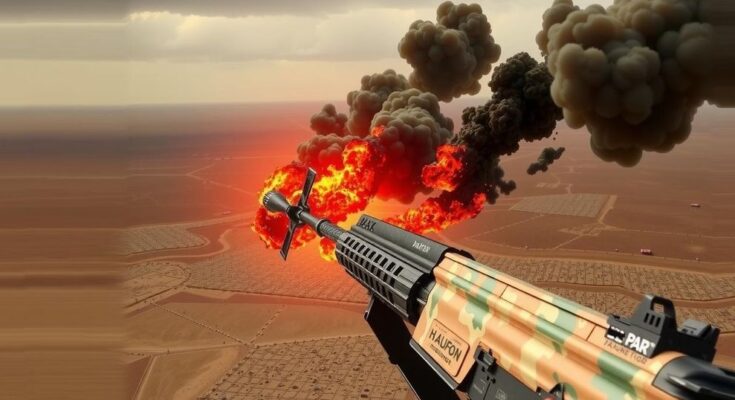Sudan is on the brink of a de facto partition due to ongoing conflict between the Sudanese army and the RSF, primarily centered in Darfur. This division poses serious threats to national integrity and could lead to increased local conflicts and state collapse. The army’s recent victories and international support contrast with the RSF’s regional stronghold, creating a complex power dynamic. Analysts warn that total control of Darfur by the RSF may entrench further political fracturing, complicating peace efforts and exacerbating the humanitarian crisis.
Sudan is facing a potential de facto partition as the civil war between the armed forces and the paramilitary Rapid Support Forces (RSF) persists. With the RSF firmly entrenched in the western region of Darfur, which is comparable in size to France, the growing divide poses a threat to the country’s integrity. Analysts warn that such division could result in localized conflicts and a further breakdown of state structures, predicting dire consequences for the nation. “A split would be the beginning of the end for Sudan,” stated Kholood Khair, founder of Confluence Advisory.
Following the outbreak of hostilities in April 2023, the situation has escalated dramatically, leading to tens of thousands of deaths and millions displaced. The Sudanese army has recently regained control of Wad Madani, which had been held by the RSF for a year and experienced egregious human rights violations. The army’s alleged executing of individuals based on presumed affiliations with the RSF has further complicated the narrative.
With the RSF struggling to recruit supporters outside of Darfur, they face potential losses in strategic points like Khartoum and el-Fasher, the capital of North Darfur. This leads to speculation on whether the RSF will be able to consolidate power in other regions if the army maintains its momentum. Khair remarked, “This looks like the scenario which [the army and RSF] would be happy with because it allows both to have a military victory.”
The conflict has garnered international interest, resulting in intervention from countries like Iran, Turkey, and Egypt, which have bolstered the army’s capabilities, altering its dynamics from one year ago. The army, perceived as more robust due to enhanced logistics and weaponry, is attempting to regain control over Sudan’s territories, including those presently under RSF influence.
Despite this, analysts suggest that if the RSF succeeds in assuming total control over Darfur, they may stabilize their grasp over the region indefinitely. However, such a shift may alienate local groups like the Sudan Liberation Movement and the Justice and Equality Movement, both of which have historically sought to redress economic and political marginalization by working with the army against the RSF.
Ultimately, the ongoing strife suggests a potential for total state collapse as infighting among allied groups within both the army and RSF escalates, potentially leading to a fracturing of power that exacerbates the humanitarian crisis amidst the growing divisions in Sudan.
The civil conflict in Sudan, characterized by the rivalry between the Sudanese army and the paramilitary RSF, has evolved since its inception in April 2023. This struggle for control has produced devastating consequences, including mass displacement, a humanitarian catastrophe, and significant loss of life. The conflict is deeply intertwined with historical grievances, including issues of political marginalization and the legacy of the Darfur war. Moreover, the geopolitical interests of various foreign nations further complicate the situation as they strive to influence the outcome of this internal strife. The dynamics observed in Sudan highlight the fragility of statehood and the potential for regional instability resulting from ongoing hostilities.
The situation in Sudan remains precarious as the continued civil war threatens to further fracture the nation, potentially culminating in a de facto partition that could give rise to severe humanitarian crises and localized conflicts. With the RSF gaining entrenched control in Darfur and international interests at play, the prospect of reconciliation and stability seems increasingly remote. As power struggles and alliances evolve, Sudan’s future remains uncertain, highlighting the urgent need for international attention and intervention to address the ongoing humanitarian disaster while striving for a peaceful resolution to the conflict.
Original Source: www.aljazeera.com




